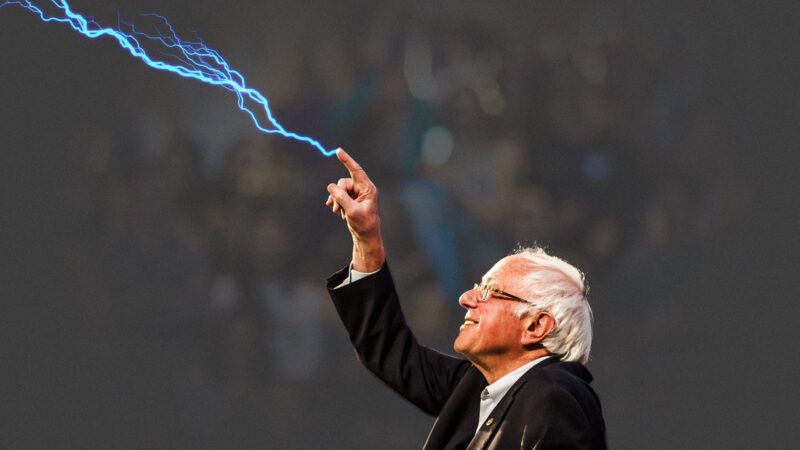Maine Voters Will Decide on Bernie Sanders-Backed Utility Plan
A plan to have the state take control of Maine's two private electric utility firms has divided the political left.

In Maine, the progressive left is pushing a plan to seize the means of electricity production—and distribution.
Don't expect the result to be lower energy bills.
Voters in Maine will decide Tuesday whether to authorize the creation of a new quasi-public entity to run the state's electric utility services. If approved by a majority of voters, Maine Ballot Question 3 would allow the new Pine Tree Power Company to "purchase or acquire"—via eminent domain if necessary—the state's existing private electric production facilities and distribution lines. The new company would be governed by a board with a mix of appointed and elected members, and it would be the first such statewide utility entity in the country.
Most of Maine is served by a pair of investor-owned utility companies: Central Maine Power and Versant Power. Advocates of the takeover—including such progressive groups as the Sierra Club and Common Dreams—say it would deal a blow to capitalist greed.
"Power belongs in the hands of the people, not greedy corporations," Sen. Bernie Sanders (I–Vt.) declared in July when he endorsed a "yes" vote on the ballot question. "Instead of a private power system that last year sent $187 million in profits out of the country, Mainers can have cheaper, more reliable power—and help fight climate change at the same time."
In reality, the proposal is likely to cost Maine's electricity consumers, since the new utility collective would have to buy out the two existing utility companies—and take on their debt—at a price tag estimated to be around $10 billion. According to the Portland Press Herald, that means ratepayers would have to cover a $500 million annual debt service payment before they get a single watt of electricity.
The issue has fractured the political left. Most notably, the Maine AFL-CIO and the local chapter of the International Brotherhood of Electrical Workers, the union that represents workers for the existing utility companies, have come out against the proposal, with the latter declaring: "With politicians who have no utility experience in charge, the decisions on how to invest in the grid would be driven by thoughts of the next election, not what's best for workers and customers over the long term."
The unions are joined, somewhat unusually, by the Maine Chamber of Commerce, whose president has warned that the plan is "bad for businesses, bad for workers, and bad for anyone who has to pay an electric bill."
Residents of Maine can't be blamed if they want changes in how their state's electric utilities operate. Central Maine and Versant ranked dead last in customer satisfaction within their respective categories in last year's J.D. Power surveys.
But a state takeover is unlikely to solve that problem. Indeed, the best way to force those utility companies to improve is to subject them to more competition. But Ballot Question 3 will take competition out of the equation by creating a state-run monopoly and then just hoping for the best.
As with many state ballot questions, there has been scant public polling in advance of the election. An October survey by pollsters at the University of New Hampshire found that 31 percent of Maine voters planned to support the ballot initiative while 54 percent were opposed.
Maine Gov. Janet Mills, a Democrat, is probably the most prominent "no" vote. Mills vetoed a bill in 2021 that would have created the Pine Tree Power Company—a move that prompted advocates to take the issue directly to the voters in this year's election.
In a statement to voters, Mills invoked journalist H.L. Mencken's aphorism that "for every complex problem there is an answer that is clear, simple, and wrong."
"Question 3 presents a rosy solution," Mills added. "In reality, I just don't see how it will improve our utilities or the services they provide. In fact, I fear it might just make things worse."


Show Comments (87)